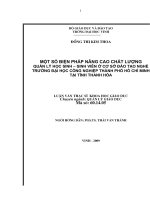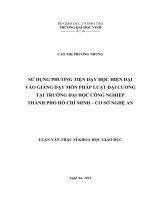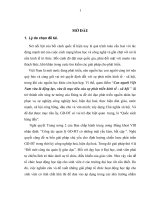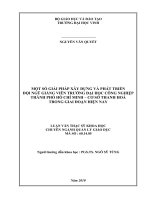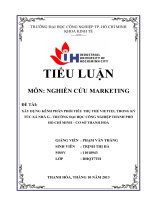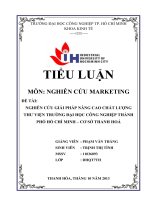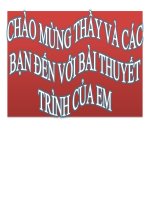Những khó khăn và giải pháp trong việc dạy từ vựng cho sinh viên chuyên ngành Nhiệt Lạnh tại trường Đại học Công Nghiệp Thành Phố Hồ Chí Minh
Bạn đang xem bản rút gọn của tài liệu. Xem và tải ngay bản đầy đủ của tài liệu tại đây (761.93 KB, 60 trang )
VIETNAM NATIONAL UNIVERSITY, HA NOI
UNIVERSITY OF LANGUAGES AND INTERNATIONAL STUDIES
FACULTY OF POST - GRADUATE STUDIES
*********
NGUYỄN THỊ THÚY HẰNG
TEACHING ESP VOCABULARY TO STUDENTS
MAJORING IN HEAT AND REFRIGERATION
ENGINEERING AT INDUSTRY UNIVERSITY OF HO
CHI MINH CITY: DIFFICULTIES AND SOLUTIONS
(NHỮNG KHÓ KHĂN VÀ GIẢI PHÁP TRONG VIỆC DẠY TỪ VỰNG
CHO SINH VIÊN CHUYÊN NGÀNH NHIỆT LẠNH TẠI TRƯỜNG
ĐẠI HỌC CÔNG NGHIỆP THÀNH PHỐ HỒ CHÍ MINH)
M.A. MINOR PROGRAMME THESIS
Field: English Language Teaching Methodology
Code: 60 14 10
Hanoi – 2013
VIETNAM NATIONAL UNIVERSITY, HA NOI
UNIVERSITY OF LANGUAGES AND INTERNATIONAL STUDIES
FACULTY OF POST - GRADUATE STUDIES
*********
NGUYỄN THỊ THÚY HẰNG
TEACHING ESP VOCABULARY TO STUDENTS
MAJORING IN HEAT AND REFRIGERATION
ENGINEERING AT INDUSTRY UNIVERSITY OF HO
CHI MINH CITY: DIFFICULTIES AND SOLUTIONS
(NHỮNG KHÓ KHĂN VÀ GIẢI PHÁP TRONG VIỆC DẠY TỪ VỰNG
CHO SINH VIÊN CHUYÊN NGÀNH NHIỆT LẠNH TẠI TRƯỜNG
ĐẠI HỌC CÔNG NGHIỆP THÀNH PHỐ HỒ CHÍ MINH)
M.A. MINOR PROGRAMME THESIS
Field: English Language Teaching Methodology
Code: 60 14 10
Supervisor: MA. Phan Thị Vân Quyên
Hanoi – 2013
iv
LIST OF ABBREVIATIONS
ESP: English for Specific Purposes
HRE: Heat and Refrigeration Engineer
HREE: Heat and Refrigeration Engineering English
IUH: Industry University of Ho Chi Minh City
L2: Second language
GE: General English
T: Teacher
T1: Teacher 1
T2: Teacher 2
T3: Teacher 3
v
LIST OF CHARTS & TABLES
Chart 1: Teachers’ opinion about teaching ESP vocabulary
Chart 2: Teachers’ evaluation about students’ learning ESP vocabulary
Table 1: Teachers’ comment on the course-book
Chart 3: Teachers’ difficulties in teaching ESP vocabulary
Chart 4: Teachers’ techniques in presenting new words
Table 2: Teachers’ ways to ask students to practice vocabulary
Chart 5: Teachers’ recommendations to overcome difficulties in teaching ESP
vocabulary
Chart 6: Students’ difficulties in learning ESP vocabulary
Chart 7: Problems influenced on students’ motivation and interest
Chart 8: Students’ solutions to a new word
Chart 9: Ways of presenting vocabulary students are interested in
Table 3: Ways of learning English vocabulary of HRE
vi
TABLE OF CONTENT
Declaration………………………………………………………………………
Acknowledgement……………………………………………………………….
Abstract…………………………………………………………………………
List of abbreviations……………………………………………………………
List of figures and tables………………………………………………………
Table of content…………………………………………………………………
PART A: INTRODUCTION…………………………………………………
1. Rationale………………………………………………………………………
2. Aims of the study…………………………………………………
3. Research questions……………………………………………………………
4. Scope of the study…………………………………………………………….
5. Method of the study…………………………………………………………
6. Design of the study…………………………………………………………
Part B: Development …………………………………………………
Chapter 1: The Theoretical Background……………………………………
1.1. English for Specific Purposes………………………………………………
1.1.1. Definition of ESP………………………………………………………….
1.1.2. Classification of ESP……………………………………………………
1.1.3. Teachers‟ roles and challenges in teaching ESP ………………………
1.1.3.1. The roles of ESP teachers………………………………………………
1.1.3.2. Challenges for the ESP Teacher………………………………………
1.2. ESP vocabulary……………………………………………………………
1.2.1. What is ESP vocabulary?
1.2.2. Terminology………………………………………………………………
1.2.2.1. Definition of terminology………………………………………………
1.2.2.2. Characteristics of terminology…………………………………………
1.2.3. General vocabulary and ESP vocabulary teaching and learning…………
i
ii
iii
iv
v
vi
1
1
2
2
2
2
2
4
4
4
4
5
6
6
6
6
7
8
8
8
8
vii
1.2.3.1. Vocabulary and its role in language teaching and learning…………
1.2.3.2. What need to be taught?
1.2.3.3. Techniques in presenting new vocabulary………………………………
1.2.3.4. ESP vocabulary teaching………………………………………………
1.3. Heat and Refrigeration Engineering English (HREE)…………………….
1.3.1. Introduction ……………………………………………………………
1.3.2. Vocabulary in Heat and Refrigeration Engineering English ……………
1.3.3. HREE vocabulary teaching and learning …………………………………
1.4. Previous Research on teaching ESP vocabulary……………………………
1.5. Conclusion…………………………………………………………………
Chapter 2: Methodology……………………………………………………….
2.1. Context of the study………………………………………………………
2.1.1. Textbook………………………………………………………………….
2.1.2. Students and their background…………………………………………….
2.1.3. Teaching staff and teaching methods……………………………………
2.2. Method of study……………………………………………………………
2.2.1. Research questions…………………………………………………………
2.2.2. The participants……………………………………………………………….
2.2.3. Data collection instruments……………………………………………………
2.2.4. Data collection procedure……………………………………………………
2.2.5. Data analysis…………………………………………………………………
Chapter 3: Findings and discussion………………………………………………
3.1. Findings……………………………………………………………………
8
9
10
10
11
11
12
12
13
14
15
15
15
15
16
17
18
18
18
18
19
19
20
21
21
viii
3.1.1. Questionnaire for teachers………………………………………………
3.1.2. Questionnaire for students………………………………………………
3.2. Discussion of findings…………………………………………………………
3.3.Conclusion……………………………………………………………………
Chapter 4: Suggested Solutions……………………………………………………
4.1. Towards contextual problems……………………………………………….
4.2. Towards the students………………………………………………………
4.3. Towards the teachers………………………………………………………
4.3.1. Improve teachers‟ ESP knowledge ……………………………………………
4.3.2. Making use of visual aids ………………………………………………
4.3.3. Improving teacher's activities in teaching vocabulary……………………
Part C: Conclusion…………………………………………………………….
1. Conclusions……………………………………………………………………
2. Limitations of the study……………………………………………………
3. Suggestions for further research ……………………………………………
References……………………………………………………………………
Appendices…………………………………………………………………
21
30
35
37
37
37
38
38
39
39
41
41
42
42
i
ii
1
Part A: Introduction
1. Rationale
Nowadays English has become an international language of various industrial and
trade fields. Therefore, there are more opportunities for our students to make use of not
just their ´general´ English knowledge but they also can study their specialized subjects
in English or to perform qualified work abroad. Obviously, the students should also
have certain knowledge of specialized English (ESP) vocabulary related to their field.
Their knowledge of ESP vocabulary will help them to adapt easily to changing working
environment and meet the requirements of the present day world. “ESP must be seen as
an approach not as a product. ESP, then, is an approach to language teaching in which
all decisions as to content and method are based on the learner‟s reason for
learning”(Hutchinson and Waters 1987:19).
However, teaching and learning vocabulary in general, ESP (English for specific
purposes) vocabulary in particular is a difficult task for the teachers and students.
Besides vocational knowledge, teachers need to carry out researches in teaching
vocabulary so as to open their views and instruct students later. In my opinion, ESP
vocabulary in Heat and Refrigeration Engineering (HRE) is very interesting but
teaching and learning it successfully are extremely hard. Factually, both teachers and
learners have faced many difficulties in teaching and learning ESP vocabulary.
Facing such problems, the teachers of English of Industrial University of Ho Chi
Minh City (IUH) want to do something to change the ways of teaching and learning
vocabulary in order to improve the students' learning effectiveness to help them succeed
in their future job. Therefore, I have conducted a research to find out the main
difficulties in teaching HRE vocabulary at IUH and then to offer some solutions to
these problems.
2. Aims of the study
The study aims at:
- Finding out difficulties that ESP teachers and learners at IUH are facing in teaching
and learning English for HRE vocabulary
2
- Suggesting some solutions to teaching HREE vocabulary effectively
3. Research questions
The research is carried out with an attempt to find out the answer to the
following research questions:
1. What are the difficulties experienced by English teachers in their teaching HREE
vocabulary at IUH?
2. What major problems are HRE students facing in learning ESP vocabulary at
IUH?
3. What are solutions to improving HRE vocabulary teaching at IUH?
4. Scope of the study
The study limited itself to the investigation of difficulties in teaching and learning
ESP vocabulary to students of HRE at IUH. The solutions are also provided to help to
improve teaching and learning English in general, teaching and learning HREE
vocabulary in particular at IUH.
5. Methods of the study
The research is carried out using both qualitative and quantitative methods.
The main data collection instruments are survey questionnaires and informal
interviews. The informants are students at HRE Department and English teachers at
IUH. The questionnaire was designed in such a way that both closed and open-
ended questions to ensure deep data. One questionnaire is designed for the students
and the other is designed for the teachers. The informal interview to teachers is to
get more information to support the study.
6. Design of the study
This study is organized into 3 main parts:
Part A: Introduction: in this part the rationale, the aims, the research questions, the
scope, the method, and the design of the study is presented.
Part B: Development: It consists of four chapters.
Chapter 1 provides the theoretical background, which is relevant to the purposes of the
study.
3
Chapter 2 presents an introduction on the context of learning and teaching vocabulary
of HRE at IUH, the context of the study, the subjects, and the data collection methods
and data collection procedure
Chapter 3 is the main part of the study. In this chapter, the data will be analyzed and the
finding will reveal teachers' difficulties in teaching vocabulary to students of HRE at
IUH.
Chapter 4 includes some solutions in teaching and learning based on the findings
Part C: Conclusion: This part offers conclusions, limitations of the study and some
suggestions for further study.
4
Part B: Development
Chapter 1: Theoretical Background
In this chapter, the author addresses some theoretical angles from which she views
her ideas. Firstly, definition of ESP, classification of ESP, teachers‟ roles and
challenges in teaching ESP are given in English for Specific Purposes. Secondly, in
ESP vocabulary, it includes definition and characteristic of terminology, general
vocabulary and ESP vocabulary teaching and learning. Thirdly, to regard with Heat and
Refrigeration Engineering English (HREE), introduction, vocabulary in HREE and
HRE vocabulary teaching are presented in turn. Finally, some research of abroad and
domestic researchers is mentioned in brief.
1.1. English for Specific Purposes
1.1.1. Definition of ESP
To understand the term ESP correctly, we will ponder on certain following
clarifications. The first one is that of Hutchinson and Waters (1987: 19). They define
ESP as „an approach to language teaching in which all decisions as to content and
method are based on the learners‟ reason for learning‟. This elucidation emphasizes that
ESP should pay suitable attention to the learners and their motions for studying it.
In an understandable way, Martin (1992: 16-23) has explained the E, S and P
elements of ESP. The „S‟ element is inclined to mean „specifiable‟. For the „E‟ of ESP,
there is a general field of „languages for specific purposes‟ (LSP). The „P‟ in ESP refers
to the learner‟s purpose, which was defined as „a combination of pre-determined or pre-
selected goal and ongoing intentionality and motivation‟. This definition of ESP shows
us a simple segregation of the three elements and explanation of each one. We can see
that the learner‟s purposes on learning specific English have been mentioned clearly.
As a teacher of ESP, the author shares the opinions that ESP serves the learner‟s
needs. This determines the learner‟s motivation, attitude and effort in learning ESP. For
vocational learning purposes, ESP may be a particular English language environment in
which learners study both the specific knowledge represented in this foreign language
and the communicative language skills needed for each specific field.
5
1.1.2. Classification of ESP
It can be seen that, language varies according to the context of use. Thus, there are
many types of ESP. Traditionally; ESP has been divided into two main areas. Kennedy
and Bolitho (1984: 4) defined the types of ESP: "English for Occupational Purpose
(EOP) is taught in a situation in which learners need to use English as a part of their
work or profession". Meanwhile, “English for Academic Purpose (EAP) is taught
generally within educational institutions to students needing English in their studies".
This division of ESP plays a very important role in affecting the degree of
specificity that is appropriate to the course. However, according to Hutchinson (1987:
16) " This is not a clear- cut distinction: people can work and study simultaneously, it is
also likely that in many cases the language learnt for immediate use in a study
environment will be used later when the student takes up, or returns a job".
According to Hutchinson, there are three categories basing on nature of the learners'
specialism. English for Science and Technology (EST), English for Business and
Economic (EBE) and English for the Social Science (ESS). Whereas, English for Heat
and Refrigeration Engineering belongs to English for Technician.
1.1.3. Teachers’ roles and challenges in teaching ESP
1.1.3.1. The roles of ESP teachers
Whether the ESP teacher should master the materials or content of the subject
matter seems a debating issue. Two points of view will be introduced in this part for
typical consideration. Hutchinson and Waters (1987: 157) think that „ESP teachers do
not need to learn specialist subject knowledge‟. They list three requirements of the ESP
teachers as follows:
- a positive attitude towards the ESP content;
- a knowledge of the fundamental principles of the subject area;
- an awareness of how much they probably already know.
When mentioning the roles of the ESP practitioner, Evans and St John (1998: 13-
14) claim that „the teacher is not in the position of the „primary knower‟ of the carrier
content of the material‟. They also believe that „the teachers have clear objectives for
6
the class and a good understanding of the carrier content of the teaching material. ESP
teachers also need to have a great deal of flexibility, to be willing to listen to learners,
and to take an interest in the disciplines or professional activities the students are
involved in.
Obviously, the ESP teacher must be flexible and their roles will vary according to
type of syllabus and course, teaching and learning environment, etc.
1.1.3.2. Challenges for the ESP Teacher.
One of the characteristics or even a critical feature of ESP is that a course
should involve specialist language (especially terminology) and content. In the majority
of cases ESP teachers are not specialists in the students‟ professional fields. That is why
the primary issue in ESP teaching is the struggle to master language and subject matter.
Teachers find themselves having to teach with texts whose content they know little or
nothing about. In addition, the ESP teacher happens to be the syllabus designer and is
responsible for the teaching material and evaluation. The basic problem in designing a
topic syllabus is that the ESP syllabus designer is not a specialist in the specific area
(e.g. engineering), consequently he/she is not capable of deciding by himself/herself
which topics to include in the syllabus to provide the required terminology. It is also
very difficult for him/her to arrange the topics in the most suitable order.
1.2. ESP vocabulary
1.2.1. What is ESP vocabulary?
In addition to ´general´ English vocabulary which include grammatical words,
basic lexical words, auxiliaries, “special lexical items appear in most professions, and
every field has special vocabulary to cover abstract concepts” (Hatch and Brown, 1995:
312). Kennedy and Bolitho (1984: 56-58) provide the following specialist word
categories for teaching purposes:
- Technical Abbreviations – e.g. kph, kgf/m2, m3 they usually do not cause a problem,
however, learners should listen to them and practice them in note-taking exercises.
7
- Symbols and Formulae – they are the subject matter of the learner‟s specialty, and
teacher may explain their function in the text, or if abbreviations are concerned, to
demonstrate their transfer from the written form into the spoken version and vice versa.
- Sub-technical vocabulary – “words that have one or more ´general´ English meanings
and which in technical contexts take on extended meanings (technical, or specialized in
some fashion)” (Trimble, 1985: 129) or as the Kennedy and Bolitho‟s definition states
“words which are not specific to a subject specialty but which occur regularly in
scientific and technical texts – e.g. reflection, intense, accumulate, tendency, isolate and
dense” (1984: 57-58). Consequently, it is the sub-technical lexis that teacher should
give high priority when teaching ESP vocabulary.
- Highly technical vocabulary – these terms are very specific and so may be less
comprehensible. Every subject has its set of highly technical vocabulary and the gap
between the generally known terms and those known just by real specialists is quite
wide in some fields. Kennedy and Bolitho suggest that these terms “should arise, in
context, in the specialist classes and are not normally the teacher‟s responsibility”
(1984: 57).
1.2.2. Terminology
1.2.2.1. Definition of terminology
Linguists have stated varieties of definitions of technology. In Longman
dictionary of applied linguistics (1985: 290) defines terminology as “the special lexical
which occur in a particular discipline”. According to Nguyen Thien Giap (1985: 308),
“Terminology, which is understood as a special linguistic unit of a language consists of
word and fixed phrase that provide definitions of objectives that belong to a particular
scientific area”. Also, Do Huu Chau (1998) states: “Terms are specialist words used
within a scientific field, a procession or any technological field”. These definitions
though rose at different times and by different people indicate that there exist “special
words in specialized fields or branches of human knowledge”,
1.2.2.2. Characteristics of terminology
8
Features of terminology have been mentioned in certain research works since the
appearance of this field. One of the theories in terminology concentrates on „assigning
terms to concepts‟. This research field is „primarily concerned with the relationship
between the real objects in the real world and the concepts represent them‟. (Cabré,
1999: 7-8) Terminology also cares about the „nature of things in the real world‟ and the
relationships formed in this world. (Cabré, 1999: 8) In addition, it is considered as
„closely linked to the special subject fields‟. Subject specialists and terminologists may
cooperate to arrange and standardize „the concepts and terms for each special field‟.
(Cabré, 1999: 9)
In summary, terminology focuses on the process from the concept to the term. It
also concerns the features of things in the reality and the relationships in that real world,
and may be used for specific subject field.
1.2.3. General vocabulary and ESP vocabulary teaching and learning
1.2.3.1. Vocabulary and its role in language teaching and learning
Words are the building blocks in a language. By learning the lexical items, we
start to develop knowledge of the target language. Based on our experience of being a
language learner, we seem to have no hesitation in recognizing the importance of
vocabulary in L2 learning. Meare (1980) points out those language learners admit that
they encounter considerable difficulty with vocabulary even when the upgrade from an
initial stage of acquiring a second language to a much more advanced level. Language
practitioners also have reached a high degree of consensus regarding the important of
vocabulary. The findings in Macaro‟s survey (2003) indicate that secondary language
teachers view vocabulary as a topic they most need research to shed light on to enhance
the teaching and learning in their classrooms. Therefore, it may be claimed that the role
of vocabulary in L2 learning is immediately recognized and implications for teaching
from substantial research are in great demand.
1.2.3.2. What need to be taught?
9
Once we have chosen what words to teach it is also necessary to know what
to teach about each lexical item. There are many categories that can be taught to know
the word properly.
According to Harmer (1991: 158) to know the word involves knowing its:
Meaning (its definition) - meanings in context, sense relations (synonyms, antonyms)
Usage – collocations, idioms and metaphors, style and register
Form – spelling and pronunciation, prefixes and suffixes, parts of speech
Grammar – irregular forms, phrasal verbs, adverbs and adjectives
“The specificity of any individual‟s knowledge about a word depends on the person and
his or her motivation, desires, and needs for the word” (Hatch and Brown, 1995: 370).
1.2.3.3. Techniques in presenting new vocabulary
According to Ur 1996:63, there are different ways of presenting new vocabulary. In the
following, different techniques of presenting the meaning of new vocabulary are shown:
Concise definition
Detailed description (of appearance, qualities…)
Examples (hyponyms)
Illustration (picture, object)
Demonstration (acting, mime)
Context (story or sentence in which the item occurs)
Synonym
Opposite(s) (antonyms)
Translation
Associated ideas, collocations
Mucia 1991:301-302 lists different techniques used in presenting new vocabulary as
follows:
10
Visual aids (Pictures, Objects)
Word Relations (Synonyms, Antonyms)
Definition, Explanation, Examples, and Anecdotes
Context
Word Roots and Affixes
1.2.3.4. ESP vocabulary teaching
“All courses are based on a perceived need of some sort. It is often argued that
the needs of the General English learner […] are not specifiable. In fact, there is always
an identifiable need of some sort.” (Hutchinson and Waters, 1987: 50). What I would
like to emphasize here is Hutchinson and Waters‟ suggestion that “it is not so much the
nature of the need which distinguishes the ESP from General course but rather the
awareness of a need” to communicate in English (1987: 53). According to Hutchinson
and Waters (1987: 55) target needs represent what the learner needs to do in the target
situation and involve necessities, are lacks and wants, and whereas learning needs
represent what the learner are expected to do in order to learn.
When we make decision about what ESP vocabulary to teach, it is necessary to
look at the above-mentioned necessities, lacks and wants in more details. According to
Hutchinson and Waters, necessities can be understood as “what the learner needs to
know in order to function in the target situation effectively,” which in terms of
vocabulary means to know vocabulary which is “commonly used in the situation
identified” (1987: 55).
So far, the objective aspects of the target needs were taken into consideration,
but also the learner has his own idea of his needs. Since the learner motivation is of
high importance in both the learning and teaching process, the learner‟s wants is the
area that the teacher has also to pay attention to when teaching ESP vocabulary. In short
“if the student does not perceive the vocabulary input to be useful it will be difficult to
engage his interest and so effective learning of everything else will also be reduced”
(Gairns and Redman, 1986: 60).
11
1.3. Heat and Refrigeration Engineering English (HREE)
1.3.1. Introduction
In the modern and open-policy society, English, both General English and
English for Specific Purposes, plays an essential part in developing the country and
fostering international integration. It is very a necessary condition for people to find
a good job. Actually, at my university, there are a lot of ESP subjects such as
English for business, English for mechanical, English for Electricity, etc. Among
them, Heat and Refrigeration Engineering English (HREE) is one of ESP subjects
which I am responsible for.
Heat and Refrigeration language is a special language. It is made up of vast pool
of words and terms that is employed by Heat and Refrigeration engineers in
translating, communicating, working with each other. In fact, Heat and Refrigeration
students have various reasons for learning Heat and Refrigeration English. Heat and
Refrigeration engineers need to learn to read and write mechanical terminology in L2
to understand how to install, operate, function air-conditioners or diagnose some
machines‟ problems so that they can repair them if they break down. For these Heat and
Refrigeration professionals, their first step to access technical language is to learn
technical words. They also need to read journals and books in Heat and Refrigeration
genres, to speak to colleagues on professional visits, to make use of the expanding
and increasingly important database available through the Internet. The second step,
technicians should apply what they have read and studied in English to their real
work.
1.3.2. Vocabulary in Heat and Refrigeration Engineering English
In the course book “English for Heat and Refrigeration Engineering” edited by
Bui Trung Thanh, a lecturer of IUH, there are a lot of technical vocabulary related to
installation, repairing, and maintaining cooling, heating, air
handling, humidification, filtering, and refrigeration equipment including motors and
machine shafts, main components of air-conditioners. Also, vocabulary about electric
wiring electronics, hydronics, air conditioning, refrigeration, solar geothermal and
12
thermodynamics are included in this course book. Through learning the technical
vocabulary, students can understand energy conservation theory and equipment as well
as energy management techniques and equipment in English. Furthermore, this course
book consists of the technical vocabulary related to a substantial component of
instruction in the physics of heat, fluids and gases, the mathematics of heat gains and
losses, and engineering design of heating and cooling systems.
1.3.3. HREE vocabulary teaching and learning
The students should be encouraged to think about the importance of the word,
therefore the examples in context are highly useful. Moreover, ESP teachers should
choose methods which must be focused predominantly on learners, each unit has to
have clear aims, motivating topics and challenging practical activities. The appropriate
issues must be presented in the context of the real life, in this case, of the present
vocational school, where “young people are given numerous opportunities to follow
purposeful learning” (Buchanan 6). As Maehr points out, in this way, teachers can
support the naturalness of learning vocabulary, and in such an enriched atmosphere,
learners find ideal authentic reasons for learning a foreign language. ESP vocabulary
can be presented, practiced and consolidated by similar methods and techniques used
for practicing and consolidation of general vocabulary. Writing tasks can include
reports and different instructions for heat and refrigeration, making summaries from
technical journals, describing processes and techniques, labeling diagrams and pictures,
describing graphs, etc.
1.4. Previous Research on teaching ESP vocabulary
ESP vocabulary teaching is carried out by various researchers from different
countries. Their aims are to find out difficulties in teaching and learning ESP
vocabulary, methods or strategies of teachers and students in teaching and learning ESP
vocabulary.
In reference to teaching and learning ESP, the study by Brikena Xhaferi at South
East European University (Macedonia) stated that English for specific purposes
course (ESP) are new trend in English Language Teaching and they include technical
13
English, scientific English, English for medical in this paper attempts to add to existing
studies on the use of ESP vocabulary learning and teaching strategies to deal with
difficulties of teachers and students. The teachers as well as students should become
aware of the importance of language learning and teaching strategies and methods to
help them eliminate difficulties and improve the ESP vocabulary teaching and learning
at this university.
These findings are further supported by the study conducted by Shigao Zheng
at Foreign Languages School, China University of Petroleum, Beijing “Studies and
Suggestions on ESP Vocabulary Teaching and Learning” finds out that an enhanced
awareness of cultural difference, metaphorical competence, and learners‟ autonomy in
vocabulary acquisition will effectively facilitate the vocabulary learning.
Simultaneously, a teaching model is recommended based on the findings of this survey,
which incorporates ideas advocated by cognitive linguistics. Class instruction on
vocabulary learning strategies can help students gain awareness of learning strategies.
The greater the strategy awareness of learners, the more likely they will be to use task-
appropriate learning strategies that help them overcome their general difficulties in
learning ESP vocabulary.
In the context of Vietnamese universities, there have been some studies on
difficulties in teaching ESP vocabulary to students at universities. For example, Vo Mai
Do Quyen (2005) at Thanh hoa teacher’s Training School conducted the study
“Difficulties in teaching vocabulary to students of information technology at Thanh
Hoa teacher‟s training school and some solutions” to identify the main problems of
teaching and learning ESP vocabulary of both teachers and students. Based on the
study, the researcher gave some suggestions to help teachers and students at Thanh Hoa
teacher‟s training school overcome the difficulties and cooperate with each other to
have the best result.
1.5. Conclusion
14
In conclusion, this chapter briefly presents the literature related to the study. By
presenting the most remarkable features of almost gone over and currently used
approaches to teaching and learning ESP vocabulary, the author hoped to make a note
that each of those approaches can be adaptable and utilized in a specific teaching
condition, rather than being swept away. Besides, the author also referred ESP
vocabulary teaching and learning are difficult, however, he suggested that a good
teacher should be flexible in combine a lot of techniques to present ESP vocabulary
lessons with different groups of learners more effectively. Moreover, the author also
presented the brief analysis of her ESP vocabulary teaching environment, which can be
considered as the rational for her hypothesis of the integrated approach in her own
teaching context.
15
Chapter 2: Methodology
Textbook, students‟ background, teaching staff and teaching methods presented in
the context of the study play an important role in teachers and learner‟s success or
failure in teaching and learning a foreign language. Besides, in this chapter, in method
of the study, research questions, participants, data collection instruments, data
collection procedure, data analysis are shown clearly.
2.1. Context of the study
2.1.1. Textbook
Textbook plays crucial roles in language teaching, which is indicated by different
authors in the literature. Obviously, the materials provide basic for the content of the
lesson, the balance of skills taught, and the kind of language practice students take part
in.
The course book “English for Heat and Refrigeration Engineering” is edited by
Bui Trung Thanh, a lecturer at IUH and is used as an internal material at IUH to teach
college students of HRE in 45 periods, and with the following features:
- “English for Heat & Refrigeration Engineering” for the third year HRE students consists
of 5 chapters. The syllabus consists of 45 periods (45 minutes per period) and is delivered
within 9 weeks covering 5 topics as follows: Chapter 1: Classifications of air conditioners –
Chapter 2: Main components of air-conditioners- Chapter 3: Electric Wiring – Chapter 4:
Installation – Chapter 5: Troubleshooting". The aims of this course are helping students
read and understand specialized document, enriching vocabulary related to HRE and
presenting their specialized knowledge by their own words.
- Each chapter is written clearly and understandably. Each chapter is divided into 5
parts, and each part focuses on one aspect of air-conditioning. For example, in chapter
1, it contains some aspects such as compressor, condenser, evaporator, refrigerant
controllers, metering devices.
Each week, teachers of English have to teach 5 periods of 45 minutes. The aims
and objectives of the ESP curriculum are to help students consolidate, widen and enrich
their English competence related to their majors including both language knowledge
and skills which they have gained at university. From my own experience and other
16
teachers‟ ideas and through my interviews with a lot of students at my school, the
suitability of the textbook including knowledge points (information and vocabulary
areas) is not very insufficient. Furthermore, linguistic competence like listening,
speaking, and writing is not covered in this textbook. Therefore, it can not help students
improve their skills like listening, speaking, or writing except for reading
comprehension. Furthermore, there are a lot of difficult abbreviations and too many
difficult and long terms, formulas or units in a task e.g. 1lbf/ in², H=e.σ.A T³, ft.lb/s,
Btu/lb ºF, Kj/kg.Kº, Counter-flow heat exchanger, latent heat of sublimation, mixing-
grain batch dryer, counter-flow forced draft cooling tower, PSC, PRC and so on.
Students find it hard to understand the formulas, express their understanding in
explaining the positions, functions or operations of the parts of machines by their own
words because they lack a great number of vocabulary about the matters. Therefore,
they have little interest in learning ESP and the teaching English at my university is not
satisfactory. This is obviously manifested in teaching methods used by most teachers in
my university.
2.1.2. Students and their background
Actually, there are 4 classes of HRE, which made up totally 170 students at IUH.
All of them are male students, aging from 18 to 24. The majority come from different
parts of Thanh Hoa province. Some are from several cities in Vietnam such as Thai Binh, Tay
Nguyen, Vinh, Ha Tinh City. The students coming from cities have finished three years or
seven years of learning English at secondary schools before entering the IUH.
Therefore, they have better English than others from the rural or remote areas, where there
are no good opportunities for studying English. Most of students experienced traditional
method of English teaching like “Grammar- translation method” at grade school, which
emphasizes the learning of the grammar rules of the language, not the acquisition of language
skills. Now, most of them want to learn English to read specialized documents rather
than to speak English to foreigners. Some are under strong pressure to pass exams with
high mark; the others prefer enhancing their specialized knowledge to preparing for
their future jobs. In addition, it helps students feel more confident to interact with
teacher in ESP class.
17
2.1.3. Teaching staff and teaching methods
At present, the English Group at IUH based in Thanh Hoa consists of twelve
full-time teachers. All of the teachers graduated from universities of foreign languages
such as University of Languages & International Studies - Vietnam National University,
Hong Duc University and Vinh University. Eight of them have Master degree in
English language teaching. None of them has been trained in English speaking
countries. Two teachers are taking MA courses at University of Languages &
International Studies - Vietnam National University. The teachers are quite young (aged
from 27 to 42). The oldest teacher has more than 17 years of teaching experience and the
youngest teacher has 3 years. No teachers are trained to specialize in teaching ESP. All of
the12 teachers are responsible for teaching General English and ESP to nearly 7.000
students of four departments at IUH. They even have to teach some different ESP
subjects at the same time. The teachers have to teach themselves and learn ESP subjects
from specialized teachers who are in charge of teaching these subjects in Vietnamese.
There are 3 teachers are responsible for teaching English for HRE. One of them has 5-
year experience and 2 other teachers have 3- year experience. They are energetic and
willing to devote their time and energy to teaching. However, they find it difficult to
deal with unfamiliar subject matter. Therefore, they encounter many difficulties in their
teaching process such as the lack of the specialized knowledge, the choice of teaching
methods and teaching materials.
In terms of methodology, the teachers at IUH are intensively using the Grammar-
Translation method. Most of the spoken interaction in English classes is conducted in
Vietnamese.
As mentioned above, the context of IUH reveals a situation whereby students are
required to learn English, but the English they have learned in traditional language
classes may not be used effectively in real life. It is apparent that student-centered
approach has not been widely used in teaching English at IUH. The teachers still play
the key role in classroom activities and corner the students to be active learners.
18
Therefore, we should apply more appropriate teaching techniques to improve the
situation of teaching ESP vocabulary at IUH.
2.2. Method of study
2.2.1. Research questions
The research is carried out with an attempt to find out the answers to the following questions:
1. What are the difficulties experienced by English teachers in their teaching HREE
vocabulary at IUH?
2. What major problems are HRE students facing in learning ESP vocabulary at
IUH?
3. What are solutions to improving HRE vocabulary teaching at IUH?
2.2.2. The participants
The participants in these survey questionnaires are both teachers and students. The
first group consists of 12 English teachers, including 3 teachers who are teaching HREE.
These 12 teachers of English at the university are chosen for the investigation as all of them
have been teaching ESP. They are 8 females and 4 males and have at least 3 years‟ experience
in teaching ESP. The other group includes 100 students majoring in HRE aged from 19
to 24 and randomly chosen from four HRE classes at IUH based in Thanh hoa. They are
all male students and have been learning English at least two or three years at IUH.
2.2.3. Data collection instruments
In order to collect the information for the study, the researcher uses survey questionnaire
given to teachers and students at IUH.
Questionnaire
To gain the data for the research, 2 questionnaires were administered to the
respondents. One was designed for the teachers and the other for the students. The
question items were both close-ended and open-ended. This method is chosen because it is
easy to construct, extremely versatile and uniquely capable of gathering a huge amount

